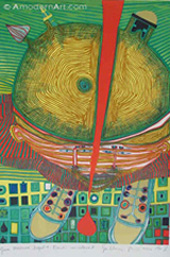

Welcome to college.
This is your first-year Critical Inquiry seminar, "Exploring the Mind and the Self" (ID1§13). Class meets Tuesdays and Thursdays from 11 to 12:15 in Pearsons 203. I am Peter Kung ; my home department is Philosophy. You are more than welcome to come by my office - right down the hall from our classroom, in Pearsons 209 - to chat. I'll definitely be in there Mondays and Wednesdays from 1:30 to 3, and I'll frequently (unless there's an interesting talk somewhere) be there Tuesdays and Thursdays from 4 to 5. You can always make an appointment to see me; the best way to get in touch with me is via email, Peter.Kung@pomona.edu .
Please check this website regularly for updates |
 Hundertwasser The Boy with the Green Hair |
What this course is about.Here's the advertised description, the one that enticed you to sign up: "What distinguishes us from most of the rest of the things in the universe? It seems fair to say that most of what we value about ourselves and other people flows from and depends on our having minds. That we have minds - that we are conscious, thinking beings, with feelings and emotions, who are free to act and control our own fate - is at the core of our self-conception. We will discuss whether, and if so, to what extent our self-conception survives careful scrutiny. What makes you the person that you are? Can we reconcile our self-conception with the detailed story that neurobiologists, cognitive psychologists, and other scientists are writing about the brain? Are we just very complicated machines - could we make a machine that thinks? Do the programs in The Matrix and the replicants in Blade Runner have minds? We will examine attempts to answer these questions in film (Memento, Blade Runner), and in both historical (Descartes, Locke) and contemporary (John Searle, Daniel Dennett) philosophy." |
|
What this course is really about.The focus of the Critical Inquiry seminar is writing. The study of philosophy offers an excellent opportunity to focus on two features that are especially important in good writing, clarity and precision. You will develop your ability to:
In casual conversation, and in class discussions, you sometimes have a point or question - you know what you want to say - but you can't quite put it into words. While this is fine for conversation, in your formal writing you are expected to present your considered thoughts on an issue. Throughout your professional life (and, more immediately, in college), you will frequently be evaluated not on what you think, but rather on what you can articulate. |
|